-
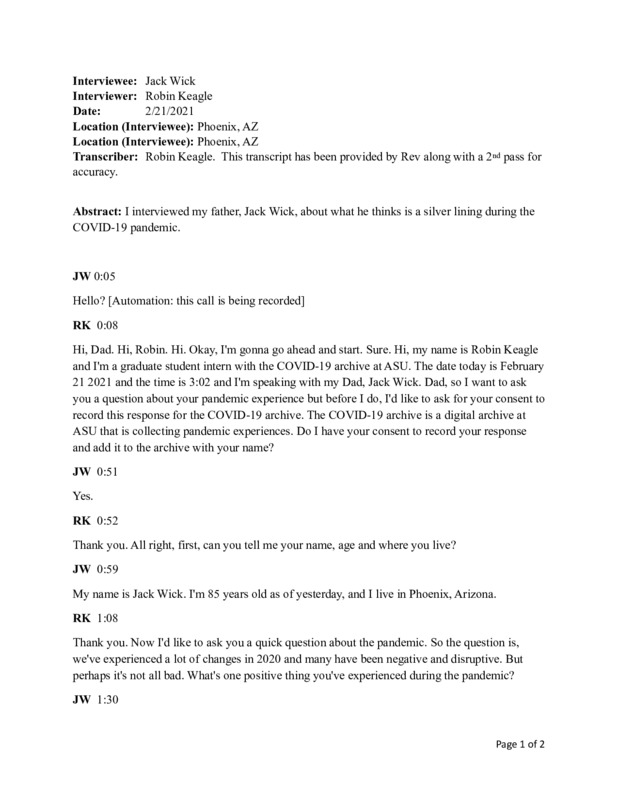
02/21/2021
This is a mini oral history interview with my father, Jack Wick, regarding silver linings during the pandemic.
-
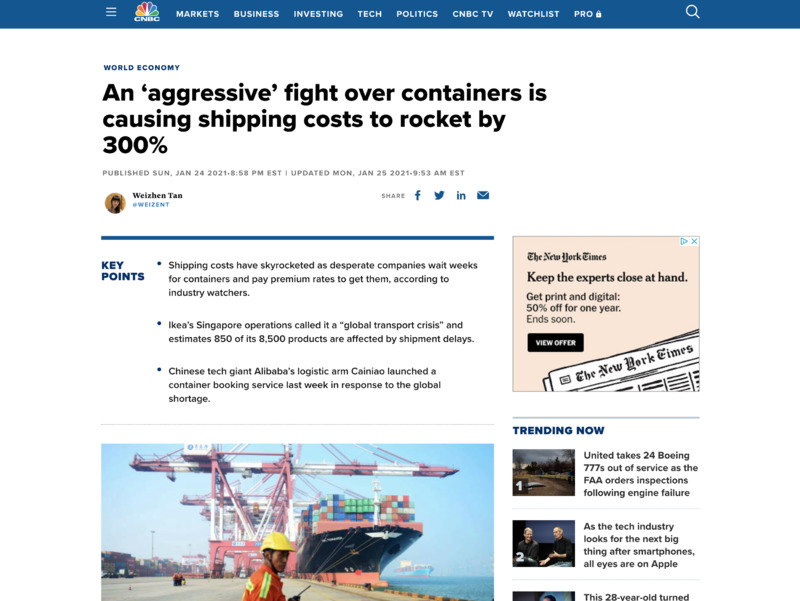
2021-01-24
Container Crisis Brought About By COVID
The US imports 3 containers of Chinese goods
whilst exporting only 1 container of goods
-
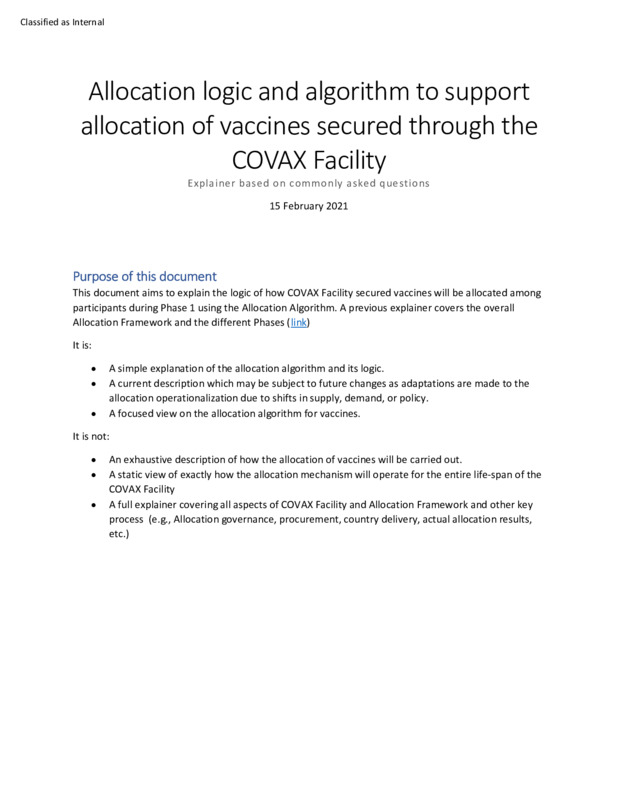
2021-02-15
COVAX - The initiative to help supply vaccines to poor countries FEB 15 publication.
-
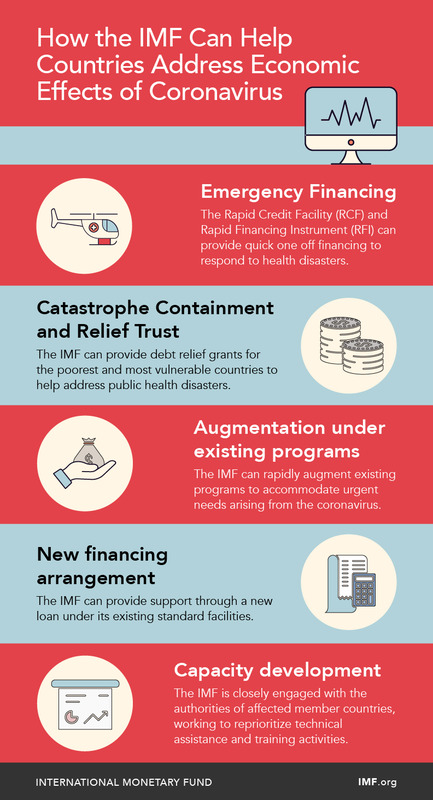
2020-06-01
Covid finance options by IMF
-
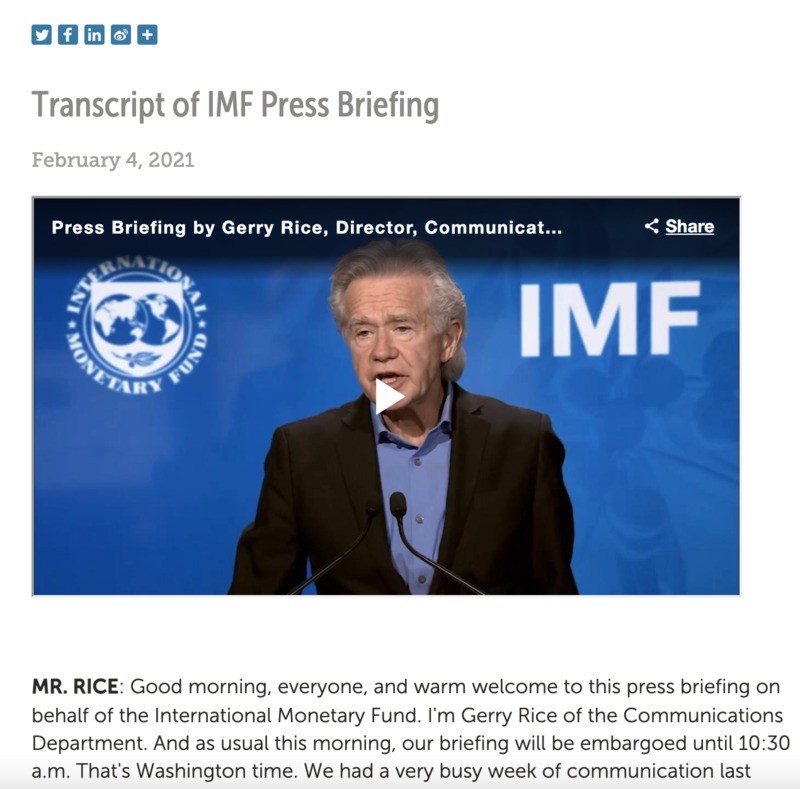
2021-02-04
Questions Reporter Asked IMF Gerry Rice [ Director, Communications Department, IMF ]
concerning Myanmar COVID Relief Money
QUESTIONER: In terms of Myanmar, recent developments in Myanmar. It seems that quite recently, just before the coup, that the IMF had given some $350 million and dedicated it toward it. I'm wondering what are your thoughts? First of all, what are the IMF's thoughts, obviously, on the coup? But also generally, how did the IMF react when there's a change of government in this way right after they've given money? Is there any -- how can you assure that the money goes, you know, for the intended purposes? That it doesn't actually support a now more military government? That's my question for today.
MR. RICE: Thank you very much for that. We are, of course, very concerned about the impact of recent events and what they could have on the people of Myanmar, and we're watching it very closely, of course, like the rest of the world. Just to remind that, of course, Myanmar faced large economic and social costs as a result of the pandemic, and the IMF resources, our support was to help the people of Myanmar to meet these urgent humanitarian needs. That was the whole purpose.
Again, just to set in context, the approval of this supports was back in January by our board and followed all standard procures for this kind of emergency financing. The same as we have done for another 84 countries in this crisis, and standard safeguards in place regarding the resources, including the repayment schedule. And as I think you know, the IMF's record over 75 years on repayment and safeguarding of IMF resources is very clear. In terms of the status of our engagement, we have had no communication at this point with the new regime, and that's about as much as I have at the moment on Myanmar.
QUESTIONER: So I had a question to follow up on Myanmar. I'm just wondering, on what happens [next]? Do you have to wait until whatever government emerges to reach out to the IMF to see if there's going to be even a relationship with the IMF going forward? And, you know, some people that I've spoken with are suggesting that well, this is kind of a pitfall of these rapid disbursing instruments that have been used. The money goes out very quickly all at once with no or very few conditions attached to it. Is there any thought to changing that at this stage and, you know, just wondering what next steps are on this? Is it just waiting till the smoke clears to decide how we engage? Also, the military generals that were appointed, a new central bank chief who was the same guy that ran the central bank when they were in power. Is there some concern that the central bank will lose its independence?
MR. RICE: Just on your last point, of course, the independence of central banks is one of the fundamental principles that the IMF believes in and supports so, you know, just to make that very clear. On your other points, clearly the situation is unfolding. In terms of recognition of the government as in other cases, we are guided by the international community, guided by the membership in terms of recognition of the government. So again, the situation is unfolding there but that's what guides us in terms of our relationship with countries.
You know, what I'd say on how the resources that we approved back in January how they are used, clearly again, as I said, these resources were for a clear purpose, the crisis, the pandemic, the helping with the humanitarian needs there. And, of course, it would be in the interest of the government and certainly the people of Myanmar that those funds are indeed used accordingly. Under the arrangement that was agreed with the previous former government, there was indeed safeguards regarding how the funds would be used as is the case with all of our emergency financing. I've talked about it here before. That included audit and, you know, transparency of how the resources are used. And again, this is true for all of the emergency financing. So while there are few conditions, as you rightly say, there are safeguard provisions and it would be our expectation that, you know, regardless of the future that these commitments would be maintained. Because those resources need to go to support the people and especially vulnerable groups.
So you asked finally where we’re thinking of changing. You know, again, we've been using these emergency financing instruments in 85 countries so far. I think they have been a huge help and assistance in the crisis especially to the poorest countries, to low income countries. And I think one of the reasons that they've been so effective and we've been able to get the support so quickly is the, you know, the conditions are relatively few. However, and again I stress, the safeguards and the governance of those resources is something that we give high priority to and each one of those has a set of safeguards. Whether it's audit or publishing of procurement contracts, you know, there's a whole series of governance related provisions that we have attached to these loans. These are very important and we're confident that the resources will be well used and for the purpose that they were intended in these emergency financing loans.
-
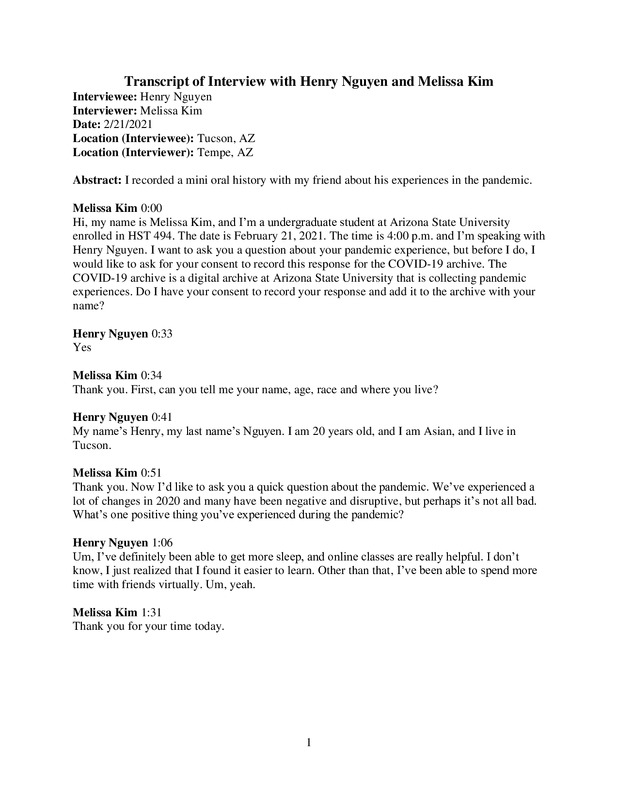
02/21/2021
I recorded a mini oral history with my friend about his experiences in the pandemic.
-
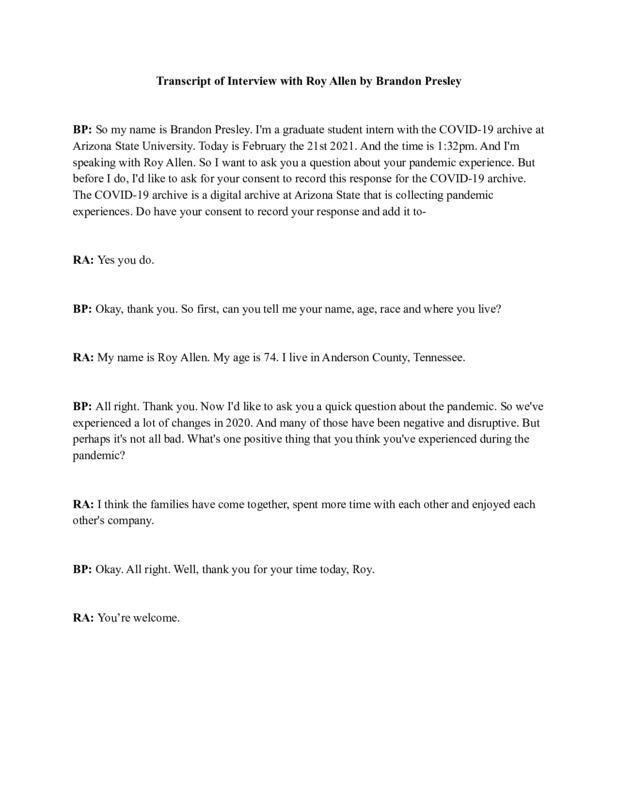
2021-02-21
This is an oral history with my grandfather, Roy. Roy believes that the silver lining from the pandemic was how much closer families are today than they were before.
-
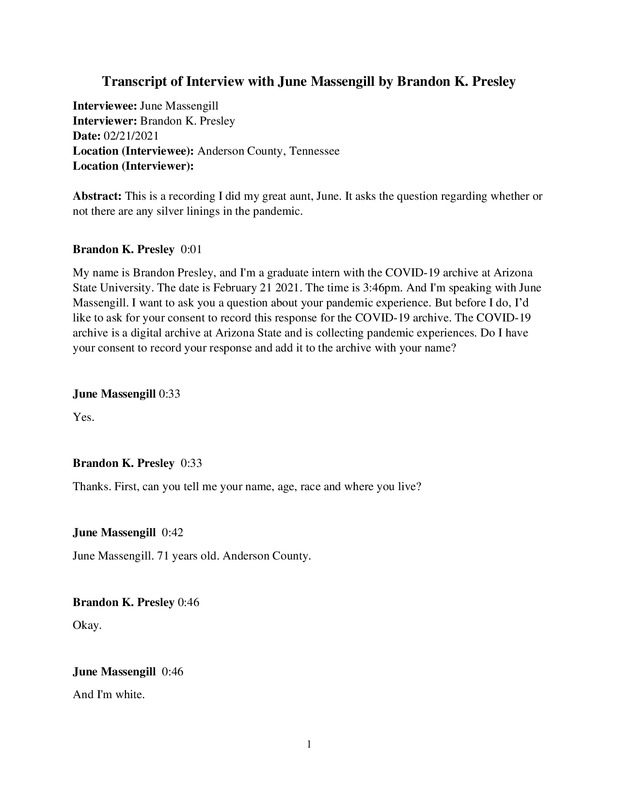
02/21/2021
This is a recording I did my great aunt, June. It asks the question regarding whether or not there are any silver linings in the pandemic.
-
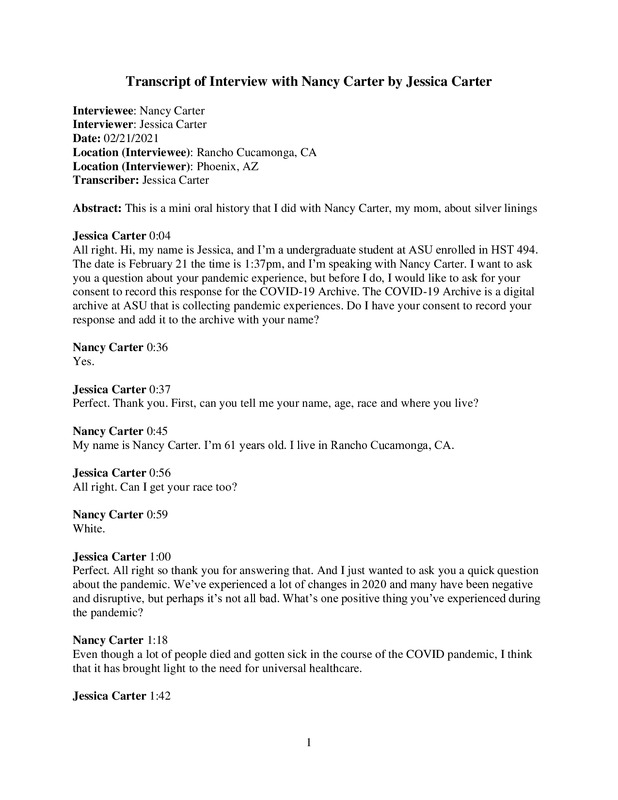
02/21/2021
This is a mini oral history that I did with Nancy Carter, my mom, about silver linings
-
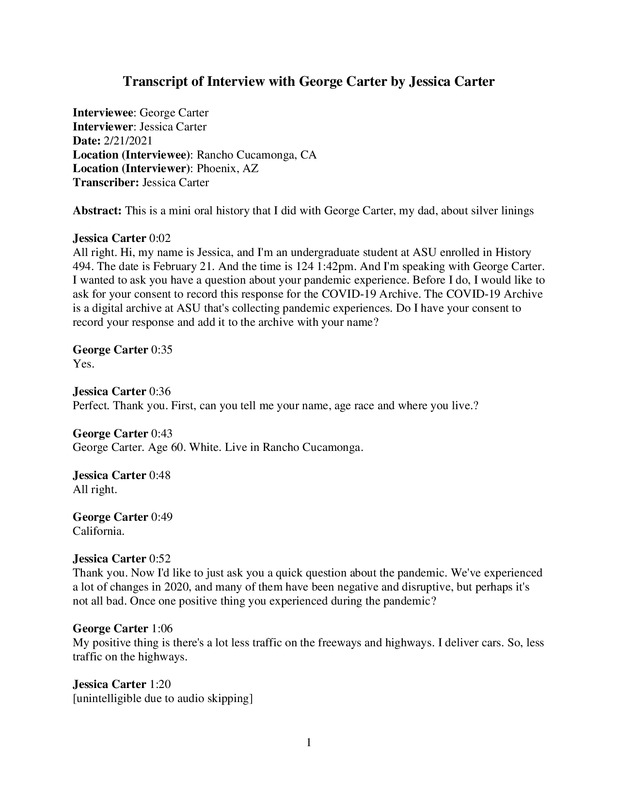
02/21/2021
This is a mini oral history that I did with George Carter, my dad, about silver linings
-
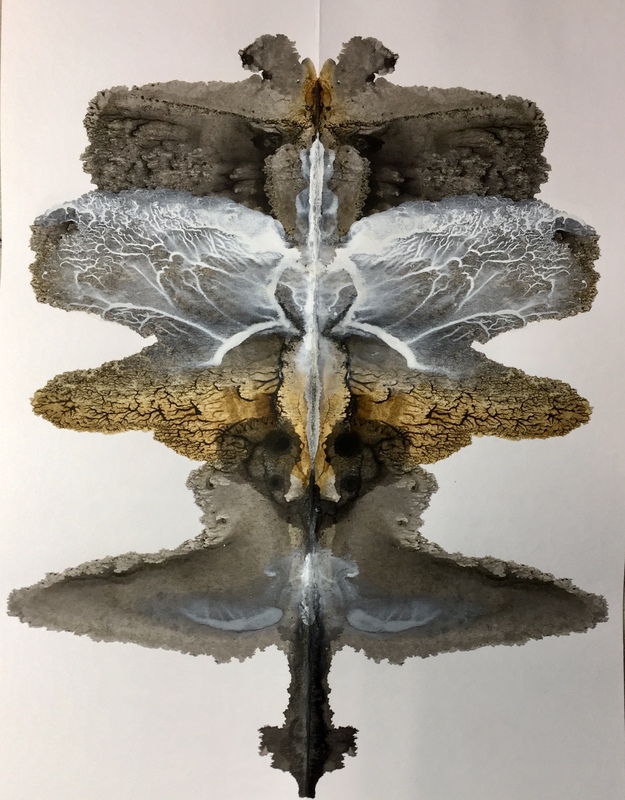
2020-04-20
When the going gets tough, the tough get going...
I think I understand the meaning of hunkering down and getting to work now. I have always loved creating and now more than ever am embracing its healing powers.
During these last six weeks I feel like we have been dodging bullets. We have become hunter gatherers looking for supplies to combat the germs. We are obsessed with stocking our little fort with enough of everything (art supplies), to survive the war.
Through it all, my husband and I have also been obsessed with creating. Me in my home studio, learning how to collage, make books, creating paintings, greeting cards and finding new techniques to immerse (distract) my self. My husband in his shop behind our house making cigar box guitars!
I read a quote from J.R. Tolkien, The Fellowship of the Ring, that sums up, like most things, will be our attitudes that will help us accept this interruption of life.....
”I wish it had not happened in my time”. said Frodo.
”So do I,” said Gandalf, “and so do all who live to see such times.
But that is not for them to decide.
All we have to decide is what we will do with the time that is given to us.”
Since the start of the pandemic I have created over 65 paintings. I need to create in order to find sanity and feel productive and not scared and anxious. The photograph is a painting I created using Rohrshadk blots as inspiration.
-
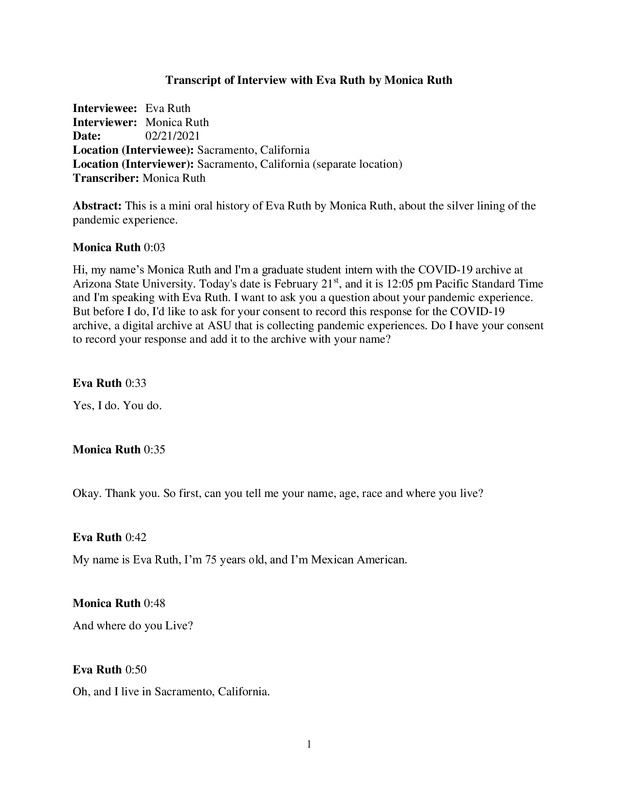
02/21/2021
This is a mini oral history of Eva Ruth by Monica Ruth, about the silver lining of the pandemic experience.
-
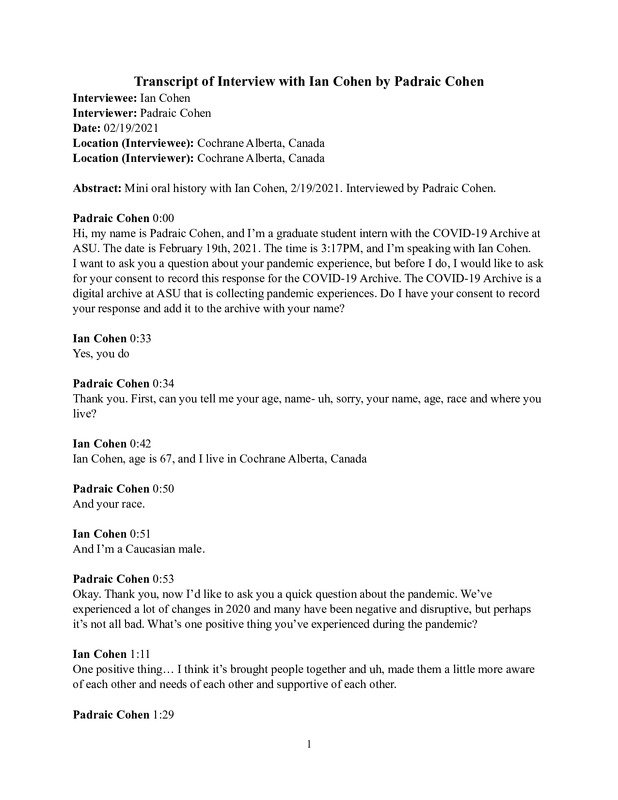
02/19/2021
Mini oral history with Ian Cohen, 2/19/2021.
Interviewed by Padraic Cohen
-
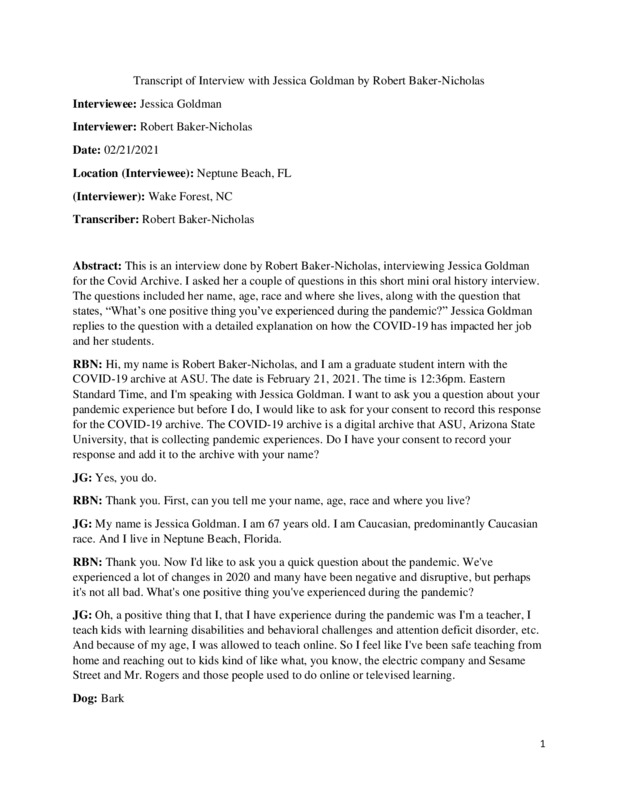
2021-02-21
This is an interview done by Robert Baker-Nicholas, interviewing Jessica Goldman for the Covid Archive. I asked her a couple of questions in this short mini oral history interview. The questions included her name, age, race and where she lives, along with the question that states, “What’s one positive thing you’ve experienced during the pandemic?” Jessica Goldman replies to the question with a detailed explanation of how the COVID-19 has impacted her job and her students.
-
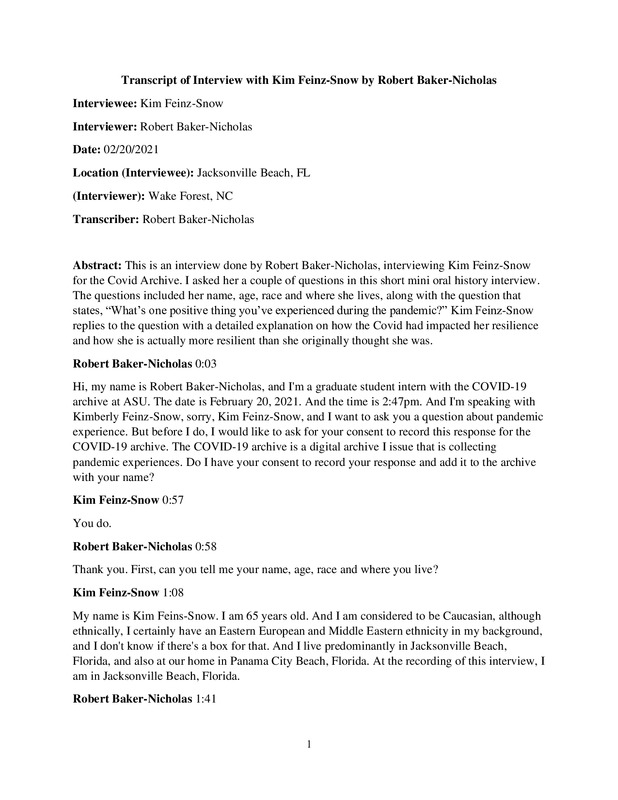
02/21/2021
This is an interview done by Robert Baker-Nicholas, interviewing Kim Feinz-Snow for the Covid Archive. I asked her a couple of questions in this short mini oral history interview. The questions included her name, age, race and where she lives, along with the question that states, “What’s one positive thing you’ve experienced during the pandemic?” Kim Feinz-Snow replies to the question with a detailed explanation on how the Covid had impacted her resilience and how she is actually more resilient than she originally thought she was.
-
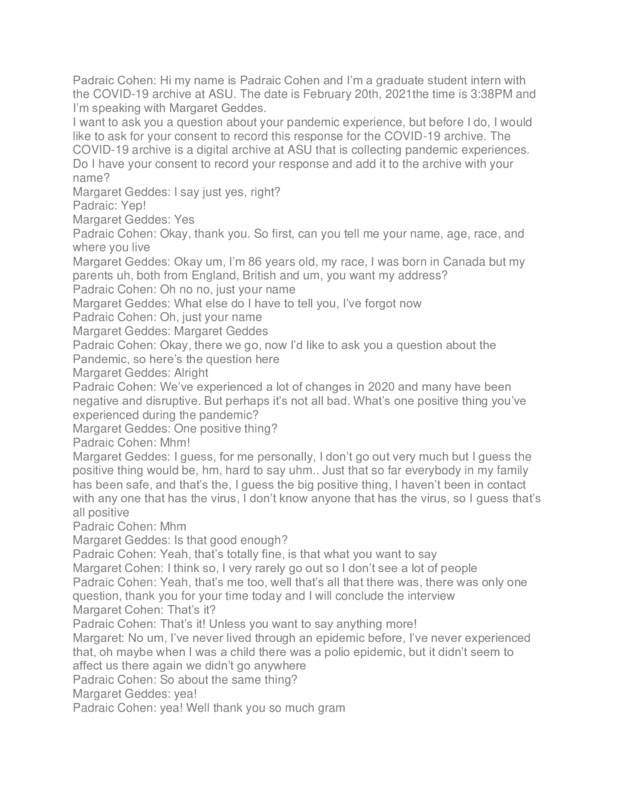
2021-02-20T15:38
Mini oral history with Margaret Geddes, 2/20/2021
Interviewed by Padraic Cohen
-
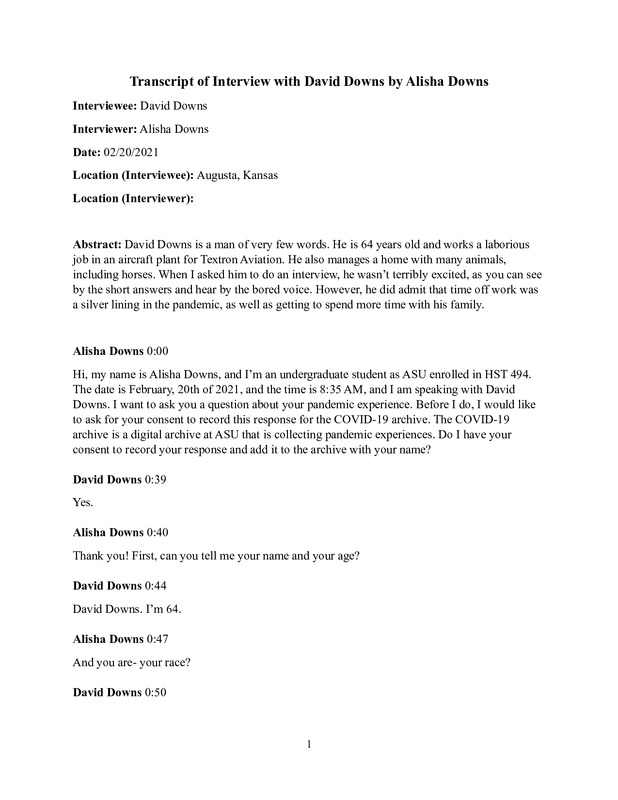
02/20/2021
David Downs is a man of very few words. He is 64 years old and works a laborious job in an aircraft plant for Textron Aviation. He also manages a home with many animals, including horses. When I asked him to do an interview, he wasn’t terribly excited, as you can see by the short answers and hear by the bored voice. However, he did admit that time off work was a silver lining in the pandemic, as well as getting to spend more time with his family.
-
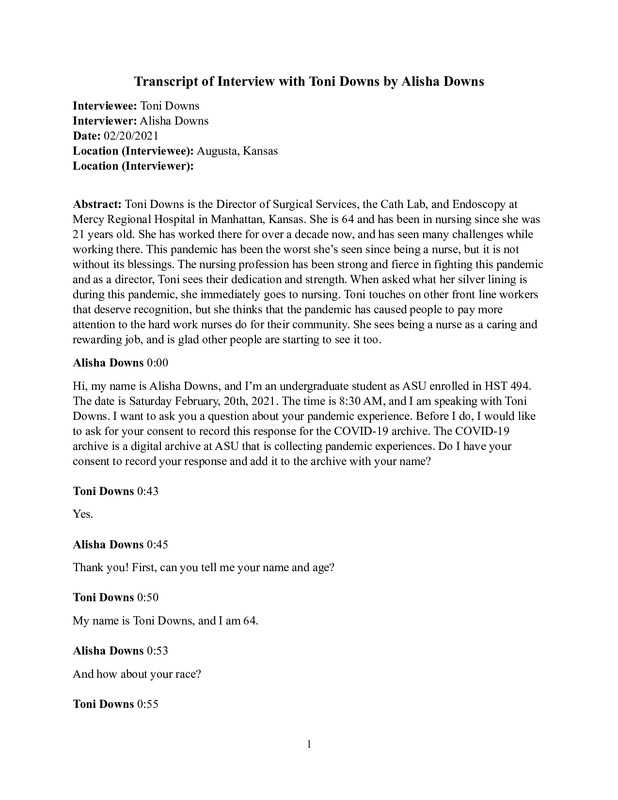
02/20/2021
Toni Downs is the Director of Surgical Services, the Cath Lab, and Endoscopy at Mercy Regional Hospital in Manhattan, Kansas. She is 64 and has been in nursing since she was 21 years old. She has worked there for over a decade now, and has seen many challenges while working there. This pandemic has been the worst she’s seen since being a nurse, but it is not without its blessings. The nursing profession has been strong and fierce in fighting this pandemic and as a director, Toni sees their dedication and strength. When asked what her silver lining is during this pandemic, she immediately goes to nursing. Toni touches on other front line workers that deserve recognition, but she thinks that the pandemic has caused people to pay more attention to the hard work nurses do for their community. She sees being a nurse as a caring and rewarding job, and is glad other people are starting to see it too.
-
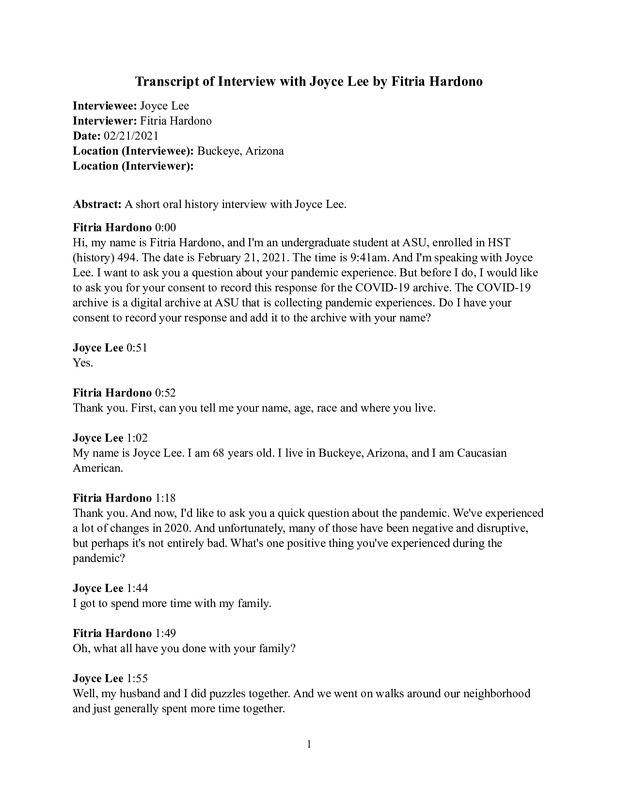
02/21/2021
Mini Oral history interview with Joyce Lee
-
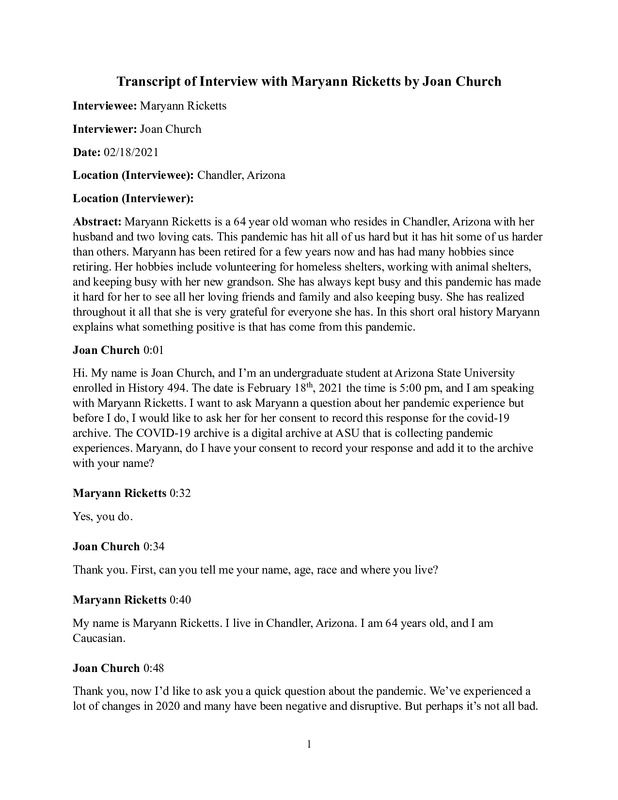
02/18/2021
Maryann Ricketts is a 64 year old woman who resides in Chandler, Arizona with her husband and two loving cats. This pandemic has hit all of us hard but it has hit some of us harder than others. Maryann has been retired for a few years now and has had many hobbies since retiring. Her hobbies include volunteering for homeless shelters, working with animal shelters, and keeping busy with her new grandson. She has always kept busy and this pandemic has made it hard for her to see all her loving friends and family and also keeping busy. She has realized throughout it all that she is very grateful for everyone she has. In this short oral history Maryann explains what something positive is that has come from this pandemic.
-
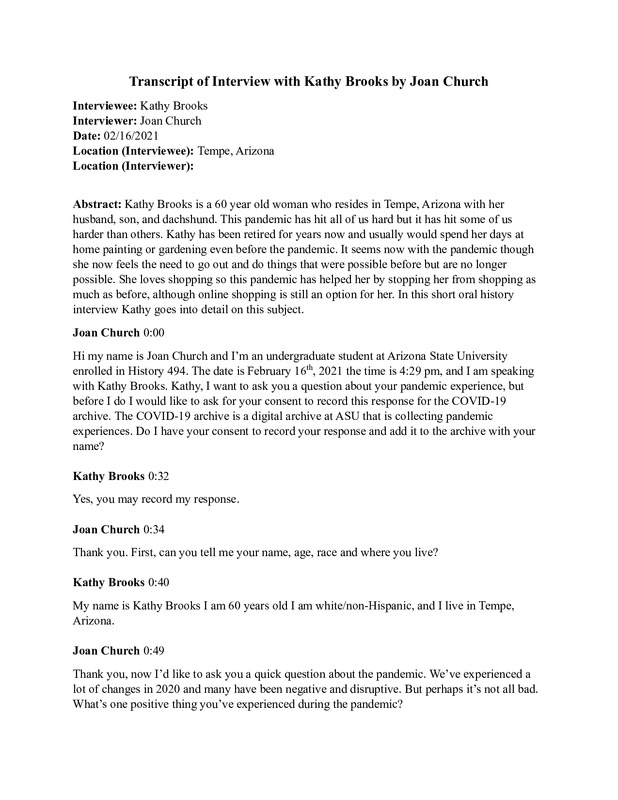
02/16/2021
Kathy Brooks is a 60 year old woman who resides in Tempe, Arizona with her husband, son, and dachshund. This pandemic has hit all of us hard but it has hit some of us harder than others. Kathy has been retired for years now and usually would spend her days at home painting or gardening even before the pandemic. It seems now with the pandemic though she now feels the need to go out and do things that were possible before but are no longer possible. She loves shopping so this pandemic has helped her by stopping her from shopping as much as before, although online shopping is still an option for her. In this short oral history interview Kathy goes into detail on this subject.
-
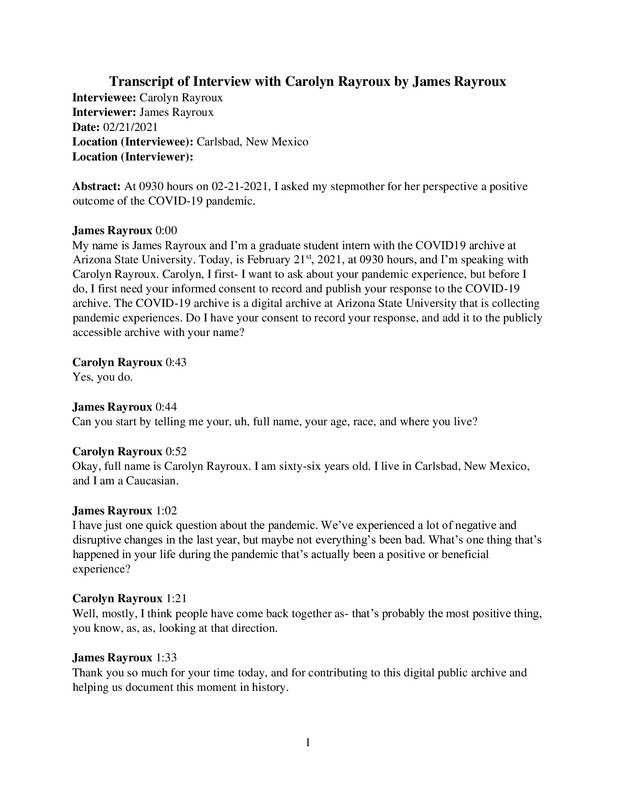
02/21/2021
At 0930 hours on 02-21-2021, I asked my stepmother for her perspective a positive outcome of the COVID-19 pandemic.
-
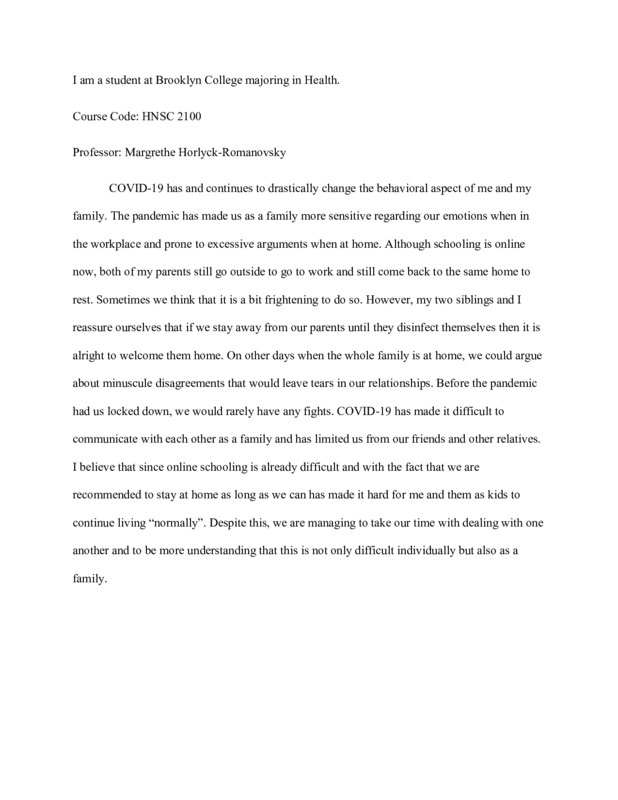
2020-03-15
This story is an ongoing experience for me as my family and I try our best to continue bearing with the lockdown. I wanted to share how things are at home because not every family is taking this situation with the same positivity.
-
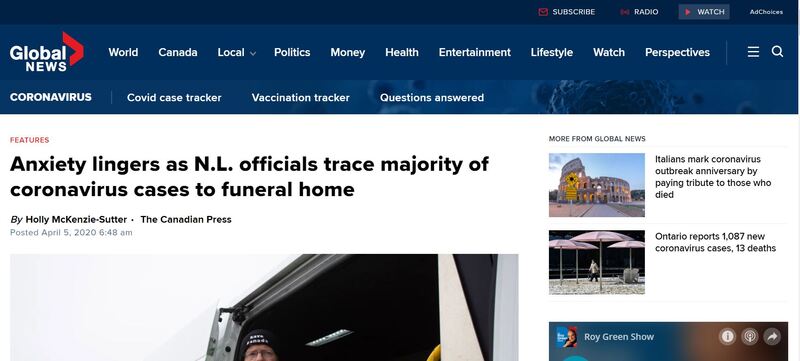
2020-04-05
Funeral home in Newfoundland was linked to a superspreader event
-
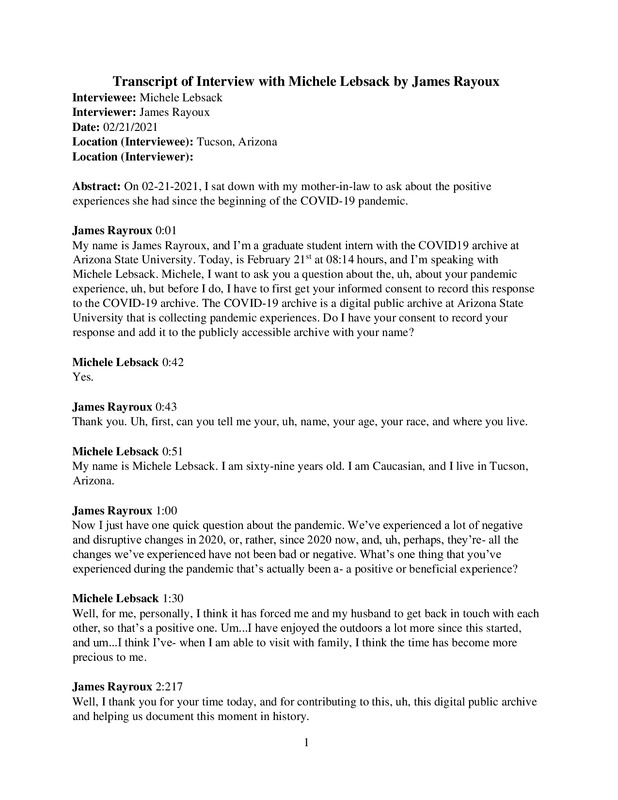
02/21/2021
On 02-21-2021, I sat down with my mother-in-law to ask about the positive experiences she had since the beginning of the COVID-19 pandemic.
-
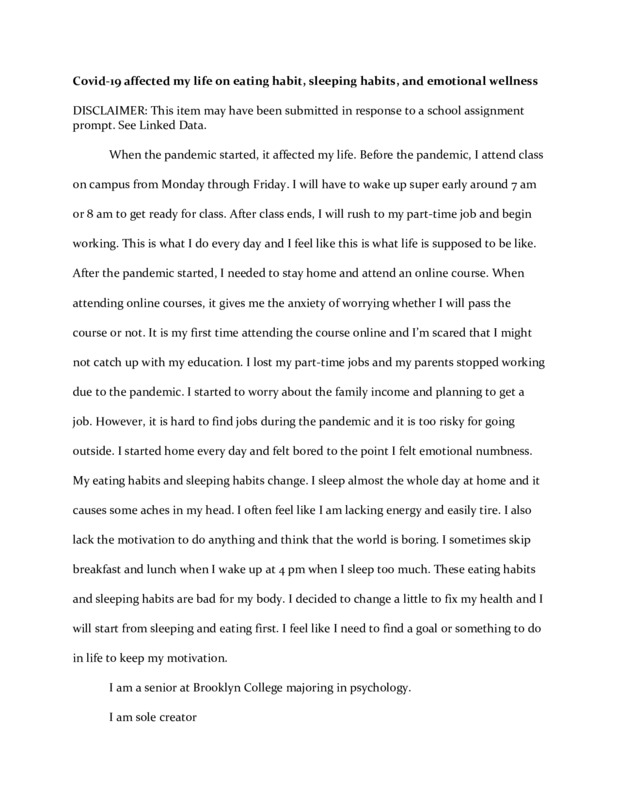
2020-03-24
When the pandemic started, it affected my life. Before the pandemic, I attend class on campus from Monday through Friday. I will have to wake up super early around 7 am or 8 am to get ready for class. After class ends, I will rush to my part-time job and begin working. This is what I do every day and I feel like this is what life is supposed to be like. After the pandemic started, I needed to stay home and attend an online course. When attending online courses, it gives me the anxiety of worrying whether I will pass the course or not. It is my first time attending the course online and I’m scared that I might not catch up with my education. I lost my part-time jobs and my parents stopped working due to the pandemic. I started to worry about the family income and planning to get a job. However, it is hard to find jobs during the pandemic and it is too risky for going outside. I started home every day and felt bored to the point I felt emotional numbness. My eating habits and sleeping habits change. I sleep almost the whole day at home and it causes some aches in my head. I often feel like I am lacking energy and easily tire. I also lack the motivation to do anything and think that the world is boring. I sometimes skip breakfast and lunch when I wake up at 4 pm when I sleep too much. These eating habits and sleeping habits are bad for my body. I decided to change a little to fix my health and I will start from sleeping and eating first. I feel like I need to find a goal or something to do in life to keep my motivation.
-
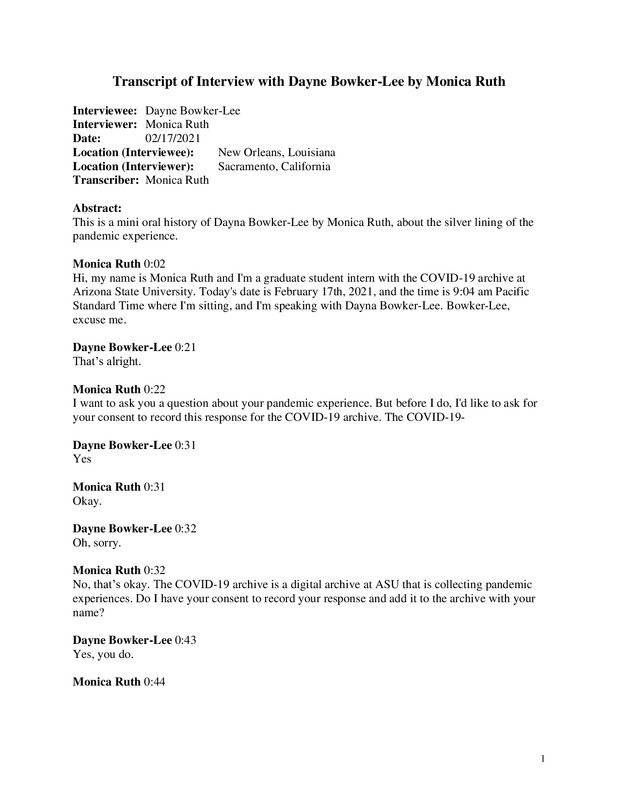
02/17/2021
This is a mini oral history of Dayna Bowker-Lee by Monica Ruth, about the silver lining of the pandemic experience.
-
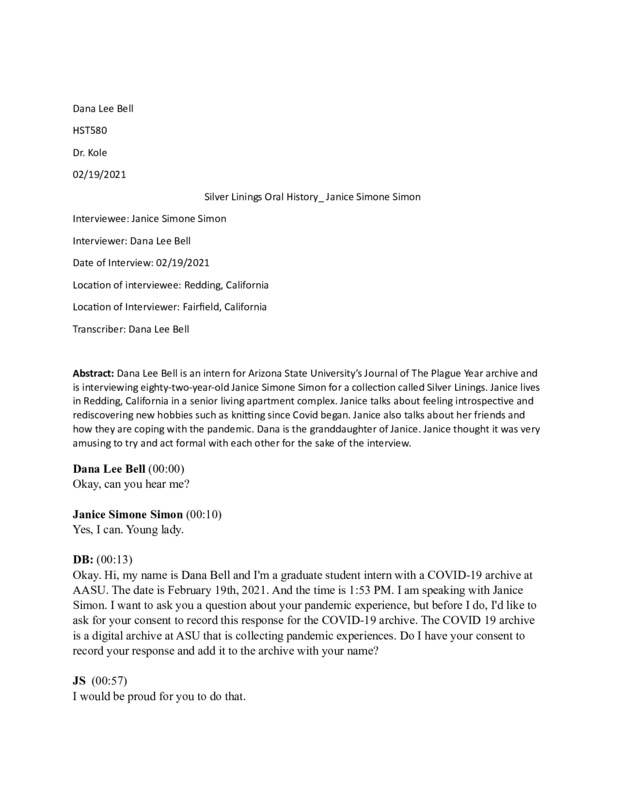
02/19/2021
Silver Linings Oral History with Janice Simone Simon
-
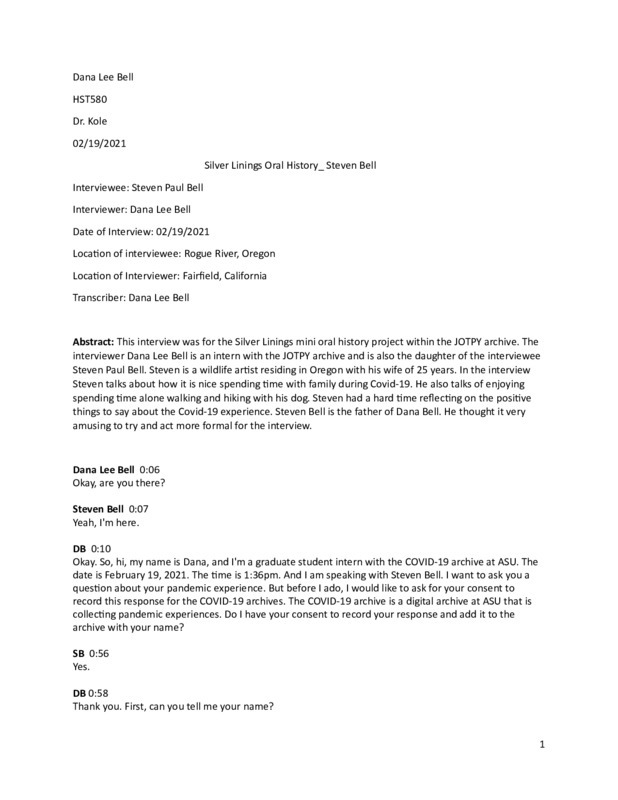
2020-02-19
Silver Linings Oral History_ Steven Bell
Interviewee: Steven Paul Bell
Interviewer: Dana Lee Bell
Date of Interview: 02/19/2021
Location of interviewee: Rogue River, Oregon
Location of Interviewer: Fairfield, California
Transcriber: Dana Lee Bell
Abstract: This interview was for the Silver Linings mini oral history project within the JOTPY archive. The interviewer Dana Lee Bell is an intern with the JOTPY archive and is also the daughter of the interviewee Steven Paul Bell. Steven is a wildlife artist residing in Oregon with his wife of 25 years. In the interview Steven talks about how it is nice spending time with family during Covid-19. He also talks of enjoying spending time alone walking and hiking with his dog. Steven had a hard time reflecting on the positive things to say about the Covid-19 experience. Steven Bell is the father of Dana Bell. He thought it very amusing to try and act more formal for the interview.
-
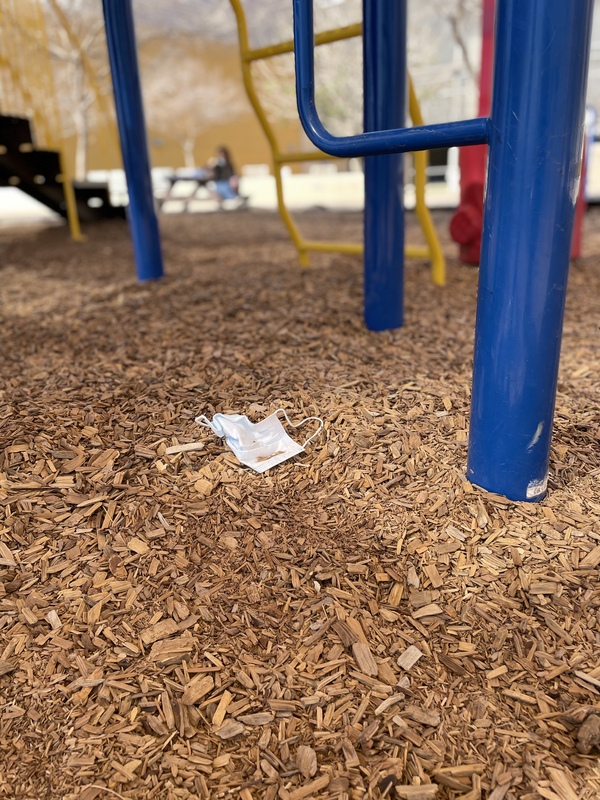
2021-02-20
Mask trash on the playground at the Kroc Center in Phoenix, AZ
-
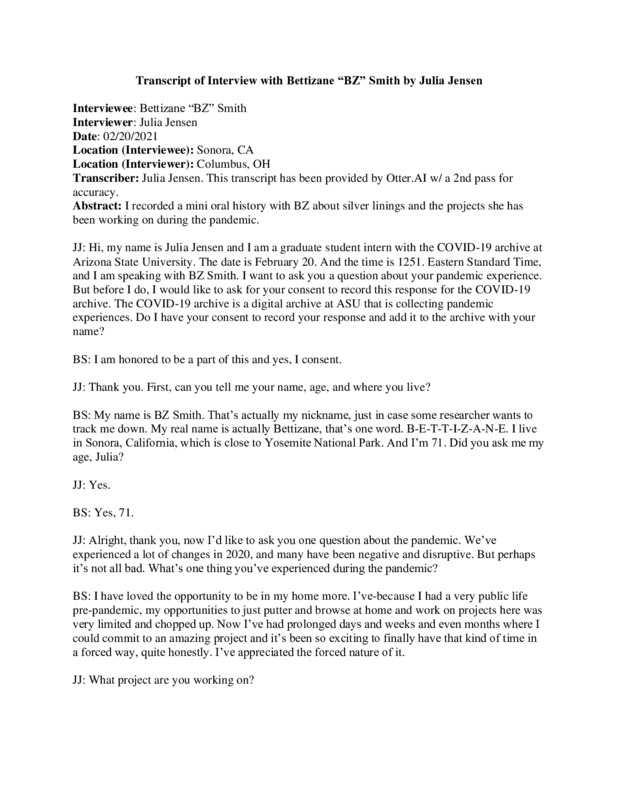
2021-02-20
I recorded a mini oral history with BZ about silver linings and the projects she has been working on during the pandemic.
-
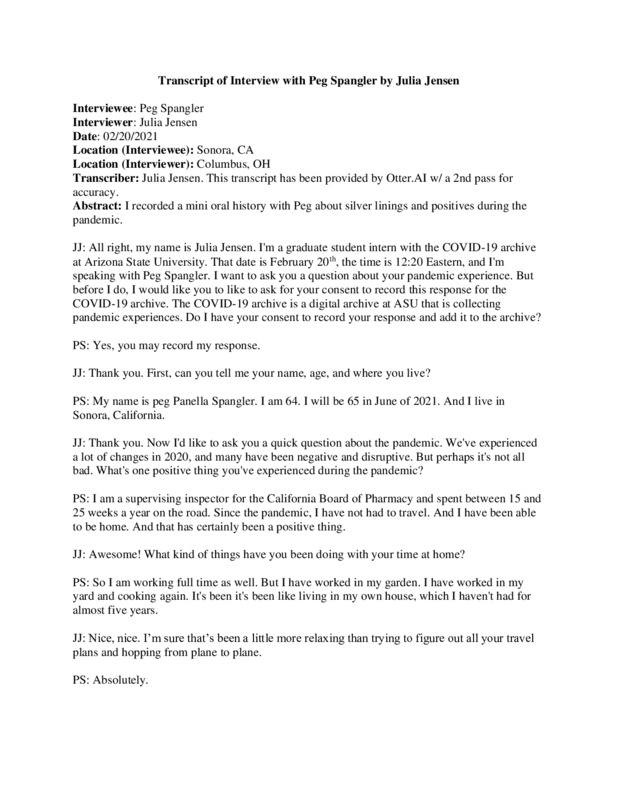
02/20/2021
I recorded a mini oral history with Peg about silver linings and positives during the pandemic.
-
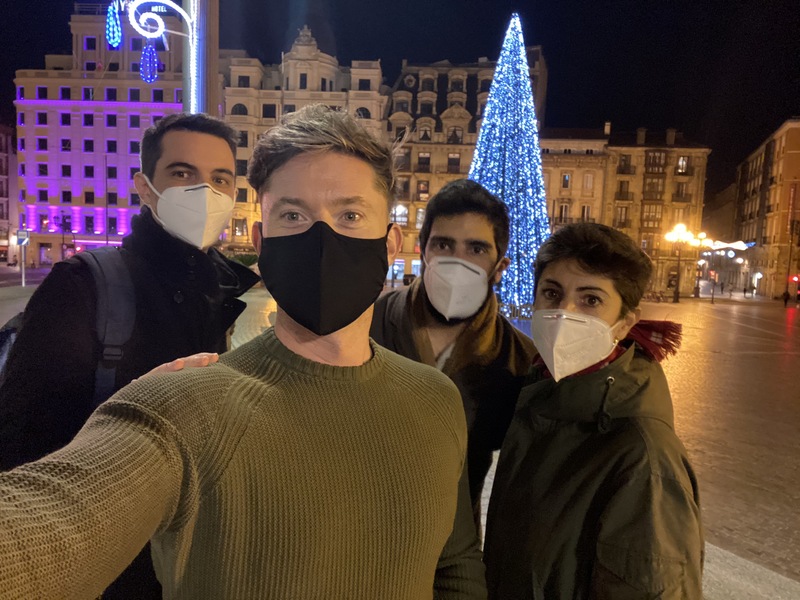
2020-11-15
In November 2020 I began reading Kirmen Uribe's novel Bilbao New York Bilbao while in Bilbao, Spain with my partner. We were there to care for his father who is suffering through the late stages of dementia and to spend time with his family who he had not seen in a year. Uribe's novel is important to my plague year for many reasons. He talks about the split mind being from Bilbao yet living in New York. My partner is from Bilbao, and the novel helps me understand his mindset. But Uribe also talks about the ways humans remember and carry pain and mark loss. Unlike trees who carry their growth in their rings or fish who mark time through their scales, humans mark time and pain through simply marking time. He notes that fish grow their entire lives, but humans start dying and shrinking from the moment we hit maturity. Growth, it seems is only for the fishes.
My plague year was marked by my entire partner's family getting the virus, a story of gradual family loss, one of borders, and of course a presidential election. The pandemic closed not only schools and bars but also borders and our chances to move between Spain and the U.S. in any straightforward way. When we began planning the trip in the summer of 2020, we came up against all of the travel bans in place. My Spanish partner could get to Spain, but I could not. So, the research began, and I spent more time on Facebook groups than any person should be allowed to. We knew we weren't going to Spain just to have fun. We needed to take care of his father, but it felt like we were doing something wrong. Love, it turns out, knows no national borders, but border agencies certainly do. To get to Spain, he just hopped a plane to Madrid. I had to go through Lisbon, London, and Paris before arriving there. On the way back, I hopped on a plane flying directly to New York. He had to quarantine in Mexico for two weeks.
Our stay there was marked by his father's continued decline but also moments of joy. The picture here captures one of those. As a U.S. citizen, his Spanish family and friends are always asking me about U.S. culture and practices. One of my tasks in Spain was to cook a big American Thanksgiving dinner, which I did with gusto. I made all the things: turkey, sweet potatoes, green bean casserole, mashed potatoes, cranberry sauce, and pecan pie. I tried to explain the significance of each dish while realizing how insignificant and somewhat gross Thanksgiving foods are. But we had fun and spent the night after the meal singing "American" songs and discussing art--his cousins are all artists.
That night, one of his friends recommended I read Uribe's novel. So, I ordered it that night. It is a lonely book of loss and thinking about how art marks that loss. I think that is how we marked our time in Spain contemplating everything we had lost in 2020 and everything we were gradually losing. We spent time at the Guggenheim and Fine Arts museums in Bilbao. In fact, we waited for my partner's COVID test while browsing the Fine Arts Museum. It turned out positive, and we separated at the point for two weeks.
But the picture here represents a moment of joy as we said goodnight to my partner's cousins after the Thanksgiving weekend. I hope for all the clichés of going back to normalcy. And we probably will get back to the "before times" given humans' inability to learn from any of their experiences. But I am one of those humans and just want to sit at a bar and talk to strangers again.
When that normalcy returns, I will look back at this picture and remember Uribe's words: "As with the growth rings of fishes, terrible events stay on in our memory, mark our life, until they become a measure of time. Happy days go fast, on the other hand--too fast--and we forget them quickly." Maybe Uribe is wrong, though. I will not be forgetting this day anytime soon.
-
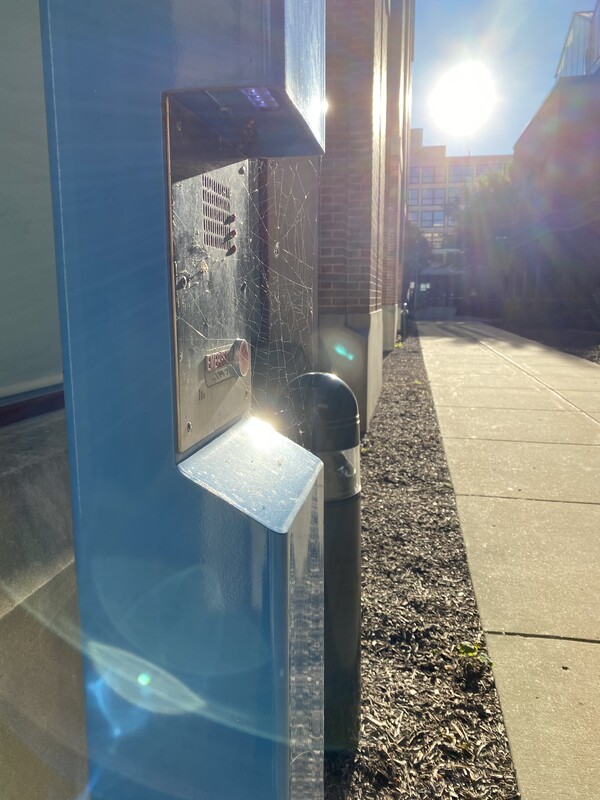
2021-02-20
It was an August afternoon, the sidewalks I walked were abandoned. I passed this safety light on DePaul University’s campus, which based on the spider web delicately entwined within, had not been touched in some time. A bug is trapped in the middle by a force they couldn’t see, till it was all too late. This bug and I were clearly friends. My life, like theirs, had been frozen in place. Everything I aimed to do, suspended for another time. Helpless to do anything, and worst of all, even seeking safety and refuge in friends and family, made a risk.
-
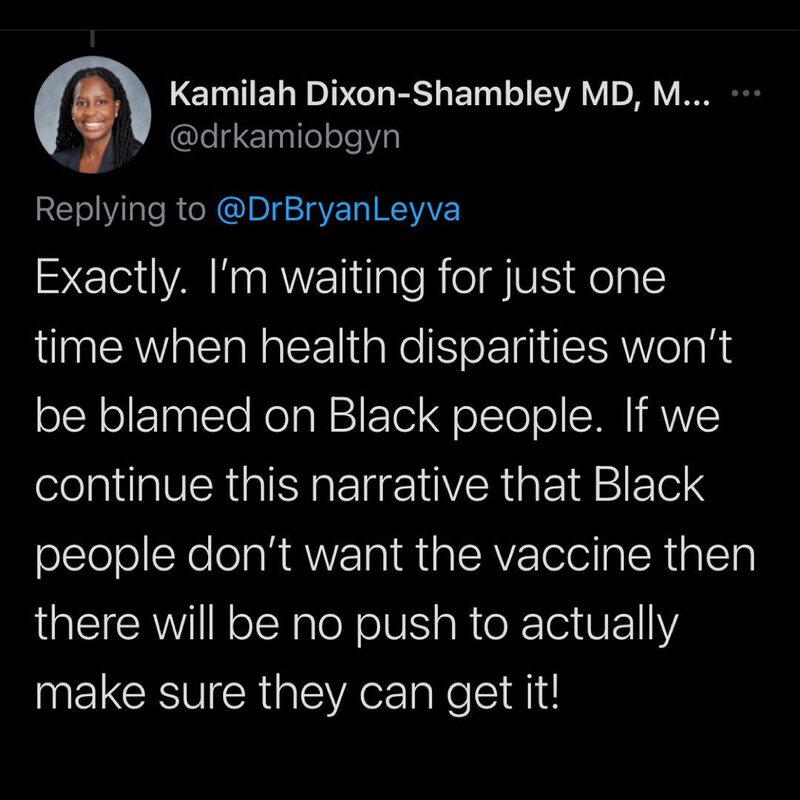
2021-02-20
“Vaccine hesitance among Black people is real but it is NOT the reason why only FIVE PERCENT of vaccinations have gone to the Black community.” This is what the original poster wrote in their social media caption on Instagram.
Many people are justifiably concerned with the current vaccine rollout and accessibility. Multiple people have taken to their respective social media accounts on Twitter to voice their thoughts about it. Vaccine hesitancy was acknowledged by handle @dch1309 as one reason for people not getting vaccinated. However, it seems that this reason is being generalized throughout the entire POC population. In reality, folks like handle @allysonxgill had the impossible task of booking an appointment to get vaccines. Meanwhile, handle @m_jones490 shared their significant other’s experience with an already-booked appointment, yet the site still had organization issues.
I think handle @claudiaalick wrote the core of what I want to say; “The United States must always blame Black people for their own suffering." From these multiple accounts, it’s clear to me that there seems to be an active mission the organizers (government) are on that keep people of color away from even the option of getting vaccinated. Vaccination sites are disorganized and inaccessible to these folks. This happens while non-POC folks fault POC folks for not getting vaccinated at all; victim-blaming at its finest.
-
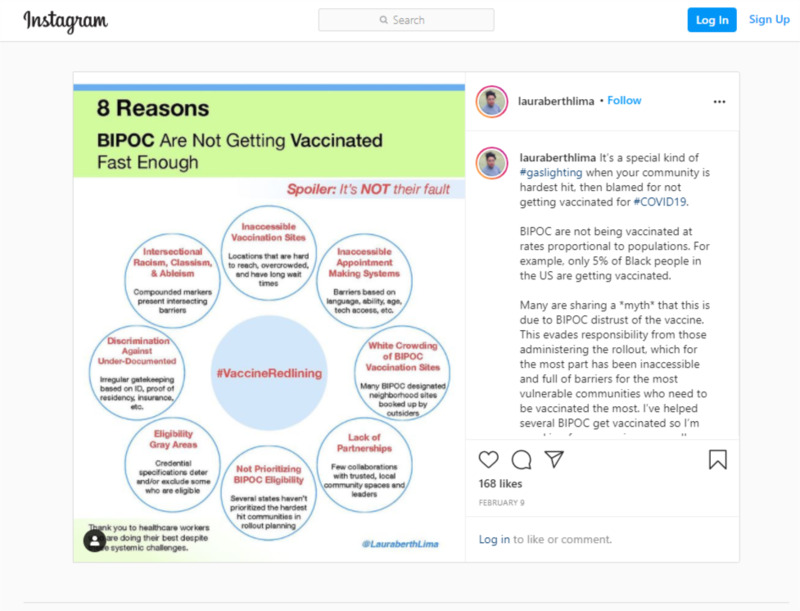
2021-02-20
The following social media post on Instagram by handle @lauraberthlima is an infographic of 8 reasons why BIPOC are not getting vaccinated fast enough. The original poster made it clear that it’s a myth how BIPOC aren’t getting vaccinated due to their distrust, and that it’s actually the difficulty in getting the vaccine. There are a few reasons that are easily guessed, such as inaccessibility and plain racism. However, the graphic and caption explain the reasons a bit more. That includes how the BIPOC-designated sites for vaccinations are being booked by non-BIPOC folks; leaving the BIPOC population without a place to get vaccinated.
Many of the posts on this archive can tell you about the vaccine rollout, how there are goals for herd immunity, and that some people have been getting vaccinated by now. This social media post tells me that BIPOC are not being considered for vaccination, and that the system of vaccine rollout right now is less than ideal. It’s as if the people in charge of the rollout are actively assuring that BIPOC folks do not get the COVID-19 vaccine, and are keeping them at risk by doing so. It’s dangerous and irresponsible, and such posts should be shared to as many people as possible.
-
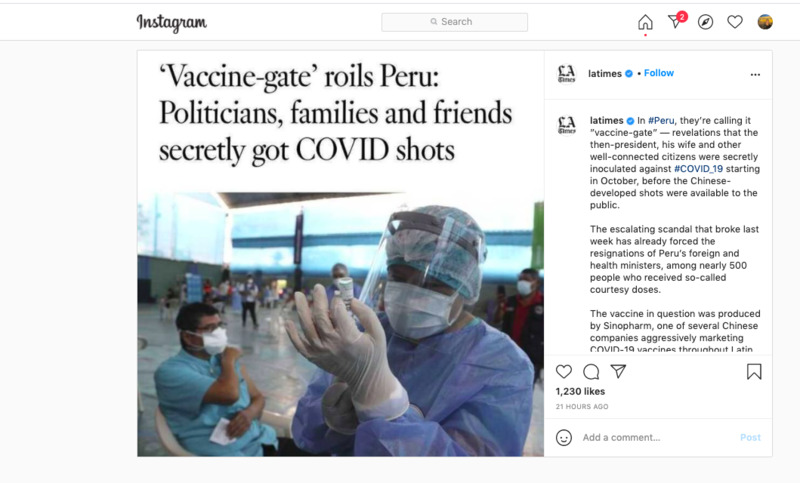
2021-02-18
Peru's president, wife, and other well-connected politicians were getting the COVID-19 vaccine back in October, provided by the Chinese company Sinopharm. The vaccines were distributed before the vaccine was publically available, and some high-level officials have resigned.
-
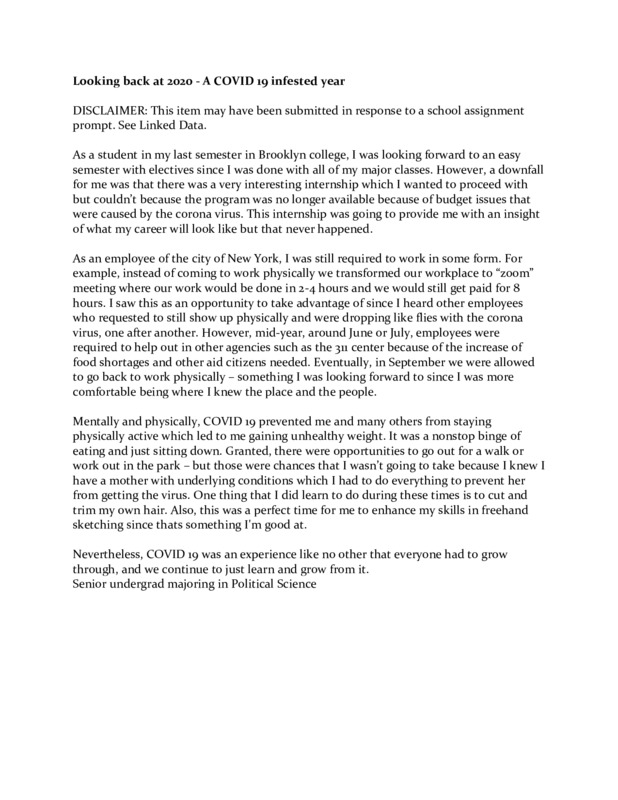
2021-02-19
As a student in my last semester in Brooklyn college, I was looking forward to an easy semester with electives since I was done with all of my major classes. However, a downfall for me was that there was a very interesting internship which I wanted to proceed with but couldn’t because the program was no longer available because of budget issues that were caused by the coronavirus. This internship was going to provide me with an insight of what my career will look like but that never happened.
As an employee of the city of New York, I was still required to work in some form. For example, instead of coming to work physically we transformed our workplace to “zoom” meeting where our work would be done in 2-4 hours and we would still get paid for 8 hours. I saw this as an opportunity to take advantage of since I heard other employees who requested to still show up physically and were dropping like flies with the corona virus, one after another. However, mid-year, around June or July, employees were required to help out in other agencies such as the 311 center because of the increase of food shortages and other aid citizens needed. Eventually, in September we were allowed to go back to work physically – something I was looking forward to since I was more comfortable being where I knew the place and the people.
Mentally and physically, COVID 19 prevented me and many others from staying physically active which led to me gaining unhealthy weight. It was a nonstop binge of eating and just sitting down. Granted, there were opportunities to go out for a walk or work out in the park – but those were chances that I wasn’t going to take because I knew I have a mother with underlying conditions which I had to do everything to prevent her from getting the virus. One thing that I did learn to do during these times is to cut and trim my own hair. Also, this was a perfect time for me to enhance my skills in freehand sketching since thats something I'm good at.
Nevertheless, COVID 19 was an experience like no other that everyone had to grow through, and we continue to just learn and grow from it.
-
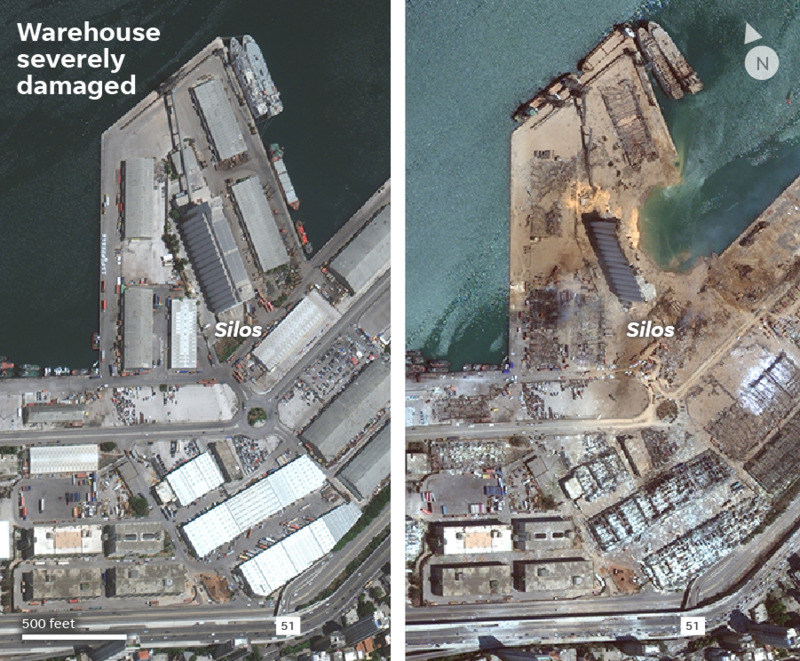
2021-02-19
Calorimetry is my least favorite part of chemistry but it usually can have very interesting applications in regard to shower thoughts, which I get a lot since I am sitting at home just thinking in my thoughts day by day. One day I was thinking about whether or not sugar was more powerful than C4 due to a MinuteEarth video saying sugar had a higher J/kg ratio than TNT so I looked into it. I found an online source saying it was 3 * 10^6 joules per pound released in an explosion. So what I did next looked at the caloric content of 1 gram of sugar: 4 calories, which in scientific terms is 4 kilocalories (our colloquial use of calorie is actually 1 kilocalorie) and then 4 kCal was translated into joules which is about 16736 joules per one gram.
453.9 grams of sugar are in one pound of sugar so then I multiplied 453.9 grams by 16736 J/g to get the number of joules stored in one pound of sugar. It equals 7.59128224 *10^6, more than double, almost triple the energy of the same amount of C4 that could be released by sugar if in the right scenario.
I was not surprised at the number but I wanted to see some real-life examples of how sugar, in the right scenarios, could possibly unleash it's hellish powers.
The attached photo is from a 2008 sugar factory explosion in Georgia, the sugar was suspended in small particles throughout the air which is the prime capability for explosions, and boy does it look strong. 14 people died and 36 were injured in that incident. Just something to think about the next time you are baking.
-
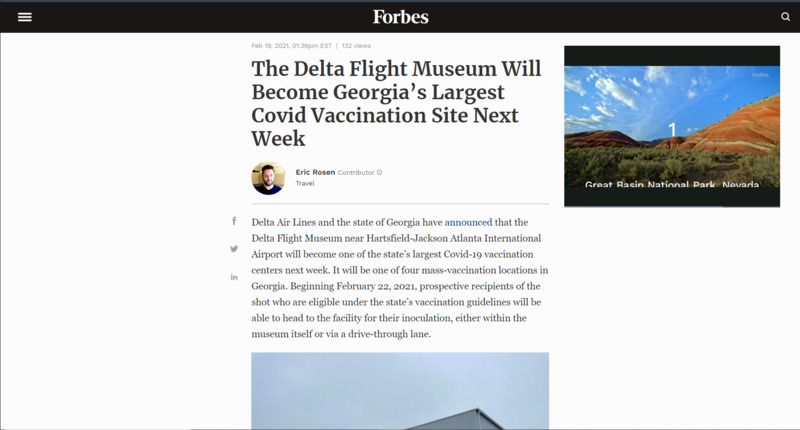
2021-02-19
The state of Georgia has announced that they are partnering with Delta Air Lines to turn the Delta Flight Museum into a vaccination center. The center will be one of four major vaccination centers in Georgia. Vaccinations will be offered through drive-thru and walk-up.
-
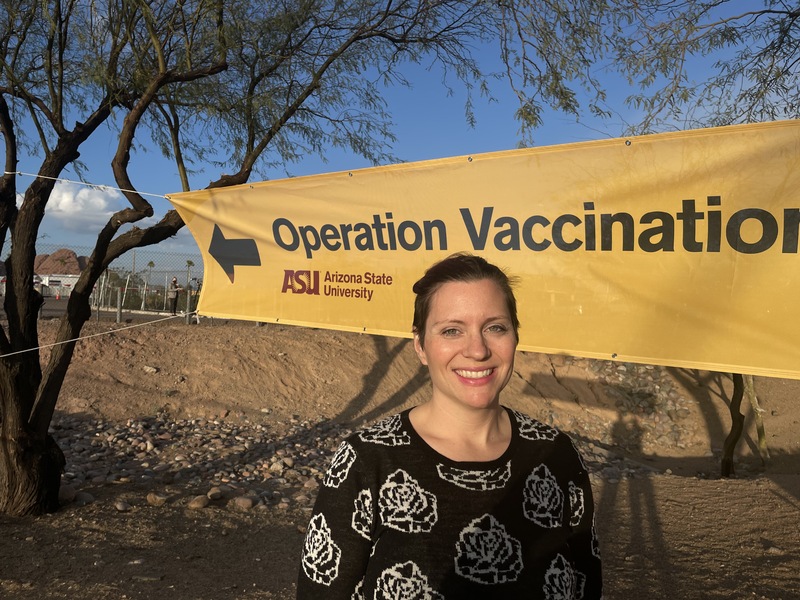
2021-02-19
ASU is now vaccinating people on campus. Members of the ASU community receive an email when they are eligible. I am eligible and have tried making an appointment twice, but the appointments are always full. After you get a vaccine, employees are supposed to upload a copy of their vacine to an ASU website.
-
2021-02-18
I moved into a place that is walking distance to the famous Trader Joe's. While I don't necessarily buy into the hype and cult-like fanbase around it (there is an entire subreddit dedicated to just posting about things people hauled from Trader Joe's!), I definitely understand the appeal. Even with COVID, the employees are still chipper and friendly as they say. My Trader Joe's is located right next to my university, and I imagine it gets a lot of foot traffic every day. Every time I go, while not necessarily always packed, the store always has people milling around. Perhaps the small store size and narrow aisles make it seem busier than it already is.
Despite this, the store is reasonably socially distanced, and everyone wears a mask. There are employees stationed at almost every part of the store, including the entrance, so safety precautions are well maintained.
With its vast assortment of unique products, Trader Joe's will still be overwhelming to me, but I look forward to exploring more of the private-label brand.
-
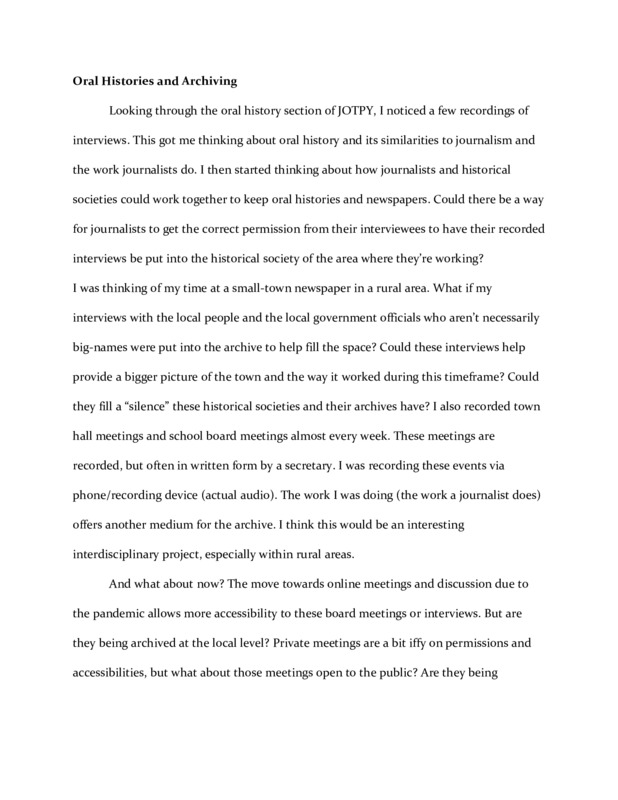
2021-02-11
Looking through the oral history section of JOTPY, I noticed a few recordings of interviews. This got me thinking about oral history and its similarities to journalism and the work journalists do. I then started thinking about how journalists and historical societies could work together to keep oral histories and newspapers. Could there be a way for journalists to get the correct permission from their interviewees to have their recorded interviews be put into the historical society of the area where they’re working?
I was thinking of my time at a small-town newspaper in a rural area. What if my interviews with the local people and the local government officials who aren’t necessarily big-names were put into the archive to help fill the space? Could these interviews help provide a bigger picture of the town and the way it worked during this timeframe? Could they fill a “silence” these historical societies and their archives have? I also recorded town hall meetings and school board meetings almost every week. These meetings are recorded, but often in written form by a secretary. I was recording these events via phone/recording device (actual audio). The work I was doing (the work a journalist does) offers another medium for the archive. I think this would be an interesting interdisciplinary project, especially within rural areas.
And what about now? The move towards online meetings and discussion due to the pandemic allows more accessibility to these board meetings or interviews. But are they being archived at the local level? Private meetings are a bit iffy on permissions and accessibilities, but what about those meetings open to the public? Are they being recorded and then placed where others can access it, and then is the local town historian or historical society archiving it as well? If they are, how are they doing it?
-
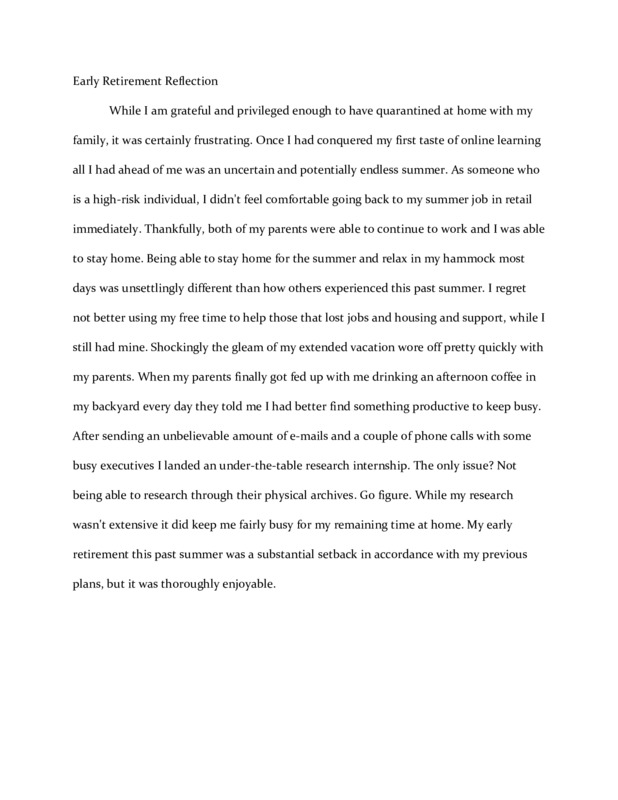
2021-02-18
While I am grateful and privileged enough to have quarantined at home with my family, it was certainly frustrating. Once I had conquered my first taste of online learning all I had ahead of me was an uncertain and potentially endless summer. As someone who is a high-risk individual, I didn't feel comfortable going back to my summer job in retail immediately. Thankfully, both of my parents were able to continue to work and I was able to stay home. Being able to stay home for the summer and relax in my hammock most days was unsettlingly different than how others experienced this past summer. I regret not better using my free time to help those that lost jobs and housing and support, while I still had mine. Shockingly the gleam of my extended vacation wore off pretty quickly with my parents. When my parents finally got fed up with me drinking an afternoon coffee in my backyard every day they told me I had better find something productive to keep busy. After sending an unbelievable amount of e-mails and a couple of phone calls with some busy executives I landed an under-the-table research internship. The only issue? Not being able to research through their physical archives. Go figure. While my research wasn't extensive it did keep me fairly busy for my remaining time at home. My early retirement this past summer was a substantial setback in accordance with my previous plans, but it was thoroughly enjoyable.
-
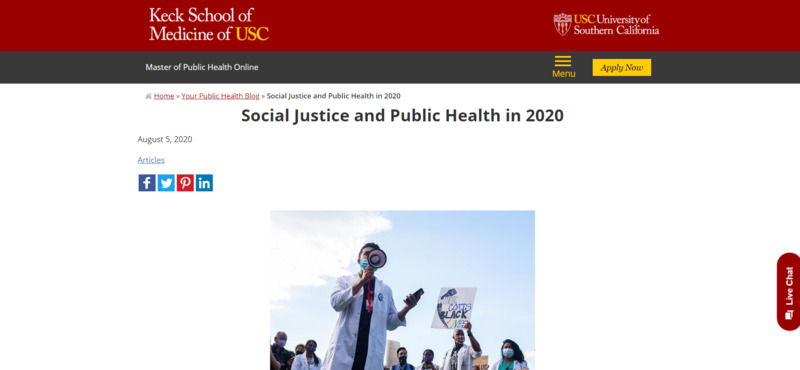
2020-08-05
From the article: The COVID-19 pandemic, caused by the spread of the novel coronavirus, has created an unexpected and unprecedented lifestyle shift for many people across the globe. Several months into the pandemic, the public has been exposed to a number of issues they might not have previously considered or thought possible, from hospitals rapidly reaching capacity and the lack of personal protective equipment (PPE) to the mental and social challenges of physical distancing and being quarantined.
-
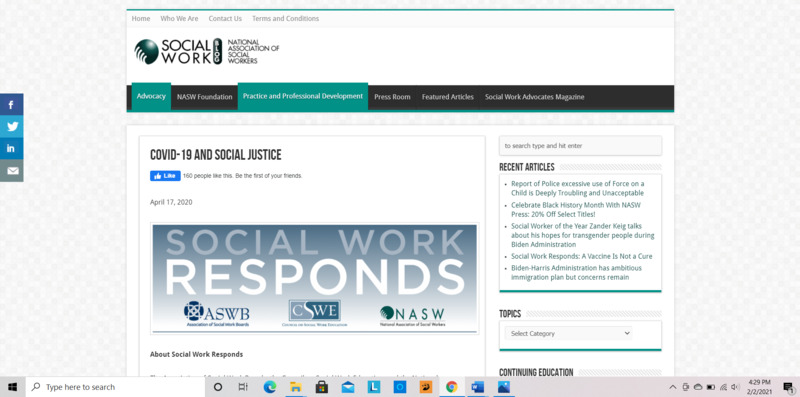
2020-04-17
From the article: The COVID-19 pandemic is a health and mental health crisis, to be sure. But it is also a crisis of social injustice, inequitably affecting vulnerable and marginalized populations that include, among others, individuals who earn low incomes, or are incarcerated, homeless, in foster care, over 65 (especially those in long-term care facilities), people of color, or undocumented. Social work practitioners, educators, and policy makers are working to address the needs of these populations despite the unpredictability of the virus’s secondary impact on systems.
-
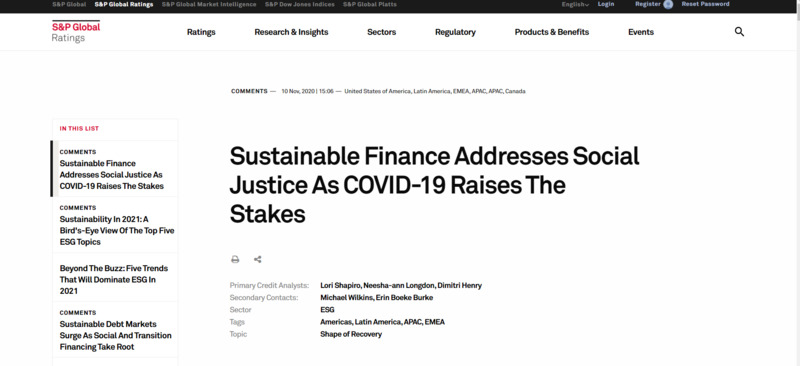
2020-11-10
From the article: Economic shocks from the pandemic have widened existing inequities around the world, leading to calls for greater social justice in dealing with this health threat.
Poorer people, minorities, and women are suffering disproportionately from growing health, housing, income, and education gaps under measures to contain COVID-19 that could set them back for years to come.
To fund programs to address the problem, governments, supranationals, and corporations, among others, have accelerated issuance of sustainable instruments--including social bonds, where issuance jumped nearly four times so far this year to US$71.9 billion from the 2019 level.
We think the sustainable debt market, partly because of the rapid rise in social bond issuance, could exceed $500 billion this year.
-
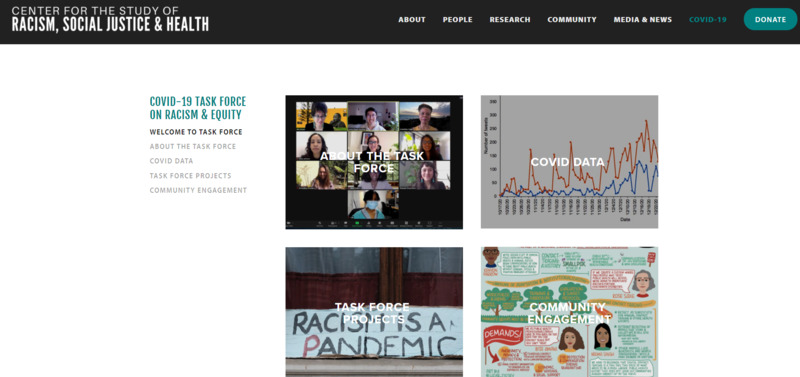
2021
COVID-19 TASK FORCE ON RACISM & EQUITY. The site looks at the science and humanity behind the Covid-19 Pandemic through a social justice lens.
-
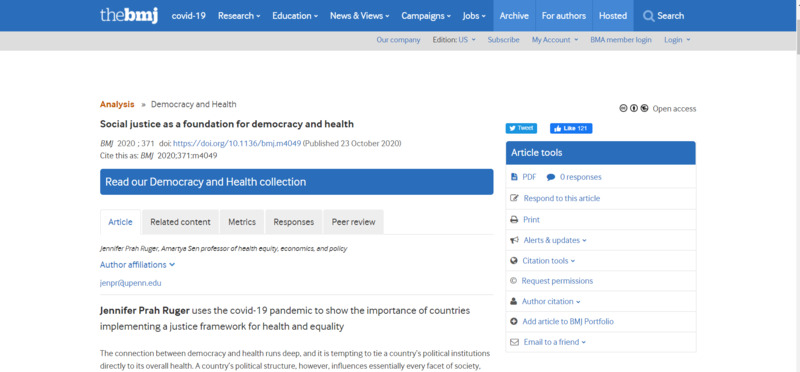
2020-10-23
From article: Jennifer Prah Ruger uses the covid-19 pandemic to show the importance of countries implementing a justice framework for health and equality.
This article is part of a collection launched at the World Health Summit, 25-27 October 2020, Berlin, Germany. Funding for the articles, including open access fees, was provided by a grant from Bloomberg Philanthropies to the Council on Foreign Relations, support from the Konrad-Adenauer-Stiftung to the Graduate Institute of International and Development Studies, and the Institute for Health Metrics and Evaluation.
-
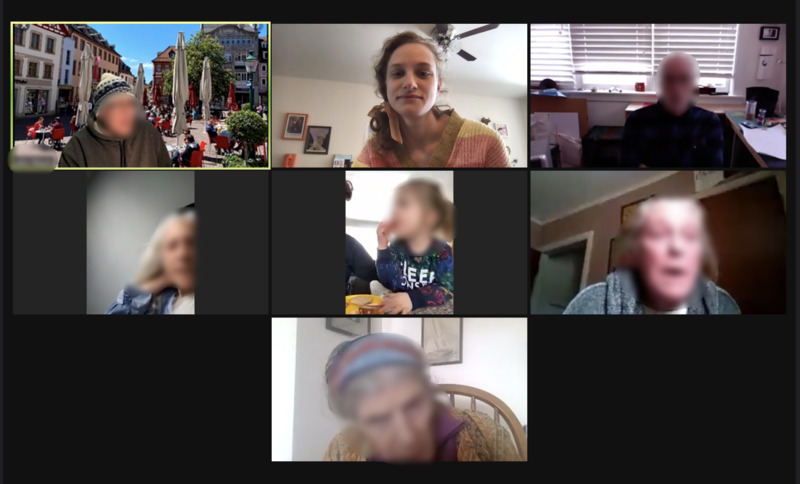
2021-02-18
At the beginning of the pandemic, when everything went into lockdown, my uncle started weekly family Zoom calls on Sunday mornings. Through these weekly calls, we actually saw each other more often than before the pandemic, and they became a nice time to check in with everybody and share stories and what's going on with our lives. My favorite part is seeing my two baby cousins, both of whom don't live near me. When we started, my youngest cousin was four months old, and through Zoom, we have watched her learn to walk and we celebrated her first birthday together. My other baby cousin loves to talk to the family and share her toys, clothes, and food through the screen. It is all very cute, and I am grateful for the family time I get to have through Zoom.
 02/21/2021
02/21/2021 2021-01-24
2021-01-24 2021-02-15
2021-02-15 2020-06-01
2020-06-01 2021-02-04
2021-02-04 02/21/2021
02/21/2021 2021-02-21
2021-02-21 02/21/2021
02/21/2021 02/21/2021
02/21/2021 02/21/2021
02/21/2021 2020-04-20
2020-04-20 02/21/2021
02/21/2021 02/19/2021
02/19/2021 2021-02-21
2021-02-21 02/21/2021
02/21/2021 2021-02-20T15:38
2021-02-20T15:38 02/20/2021
02/20/2021 02/20/2021
02/20/2021 02/21/2021
02/21/2021 02/18/2021
02/18/2021 02/16/2021
02/16/2021 02/21/2021
02/21/2021 2020-03-15
2020-03-15 2020-04-05
2020-04-05 02/21/2021
02/21/2021 2020-03-24
2020-03-24 02/17/2021
02/17/2021 02/19/2021
02/19/2021 2020-02-19
2020-02-19 2021-02-20
2021-02-20 2021-02-20
2021-02-20 02/20/2021
02/20/2021 2020-11-15
2020-11-15 2021-02-20
2021-02-20 2021-02-20
2021-02-20 2021-02-20
2021-02-20 2021-02-18
2021-02-18 2021-02-19
2021-02-19 2021-02-19
2021-02-19 2021-02-19
2021-02-19 2021-02-19
2021-02-19 2021-02-11
2021-02-11 2021-02-18
2021-02-18 2020-08-05
2020-08-05 2020-04-17
2020-04-17 2020-11-10
2020-11-10 2021
2021 2020-10-23
2020-10-23 2021-02-18
2021-02-18